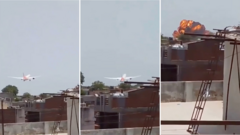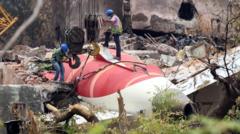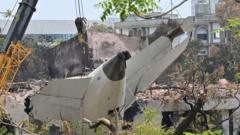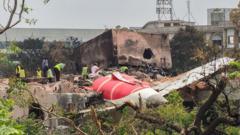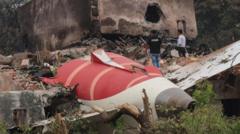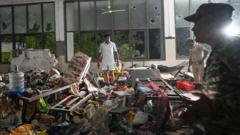The former military head of Guinea, Moussa Dadis Camara, has been pardoned on health grounds by the ruling junta, just a year into a 20-year sentence for his role in a notorious massacre. The 2009 incident, where over 150 people were killed during a rally, continues to resonate in the country amid ongoing discussions about justice and compensation for victims.
Guinea’s Former Ruler Granted Pardon Amid Controversial Massacre Convictions

Guinea’s Former Ruler Granted Pardon Amid Controversial Massacre Convictions
Moussa Dadis Camara, ex-military leader of Guinea, receives a pardon after a conviction related to the 2009 sanctuary stadium massacre that led to widespread outcry.
Guinea’s ruling military junta has issued a pardon for former leader Moussa Dadis Camara, who was serving a 20-year sentence after being convicted of crimes against humanity linked to one of the worst massacres in the nation’s history. This pardon, attributed to health issues, was announced via a decree on state television.
The massacre took place in September 2009 during a rally in the capital, Conakry, where security forces, under Camara's command, opened fire on civilians advocating for a return to civilian rule, resulting in the deaths of over 150 individuals. In the chaos, numerous women were also sexually assaulted. Camara, who initially seized power in a coup following the death of long-serving President Lansana Conté, fled the country after an assassination attempt but returned in 2022 to address charges against him, maintaining his innocence throughout the proceedings.
Following a lengthy trial lasting 22 months, Camara, now 61, and several military commanders were found guilty in July 2024. His pardon arrives concurrently with the military government's recent announcement regarding compensation payments for the victims of the massacre, a commitment made after the court mandated the convicted individuals cover these financial reparations.
As reported by Justice Info, the compensation amounts are outlined as follows: approximately $173,000 for each rape victim, $115,500 for each fatality or disappearance, $57,000 for each case of looting, and $23,000 for each instance of torture. The violence during the 2009 incident occurred when security forces, armed with teargas, charged into the stadium where thousands had gathered, leading to brutal confrontations, stampedes, and a tragic number of sexual assaults, with at least 109 women victimized.
Camara had spent years in exile after the attempted assassination, receiving medical treatment in Morocco before residing in Burkina Faso. His return to Guinea and subsequent trial highlighted the ongoing challenges of reconciling the country’s turbulent military past with emerging civilian governance, which has been shaken once again with the military coup of September 2021 that led to the ousting of President Alpha Condé.






